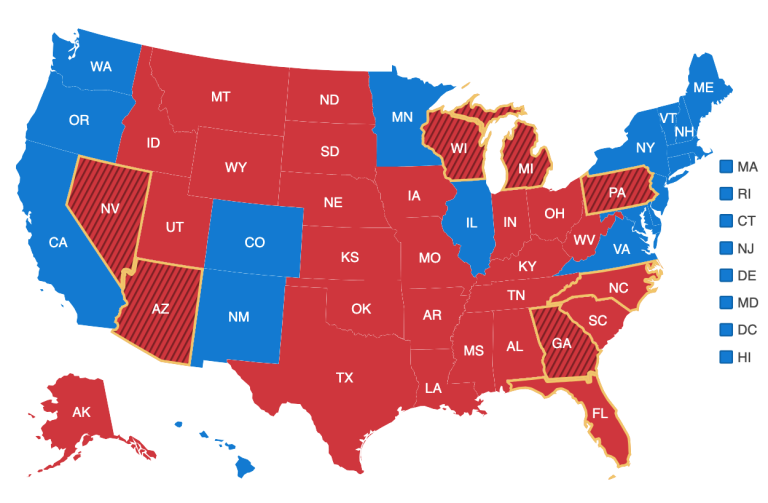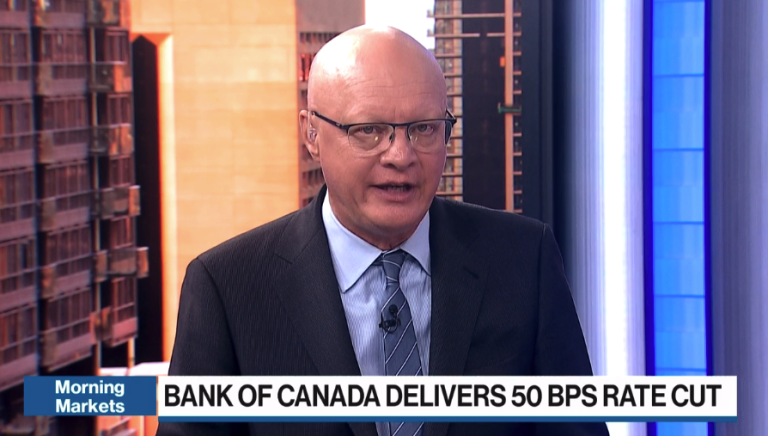Strong employment results for September have tempered Bank of Canada rate cut expectations for later this month. With the country producing a net 42,000 net new jobs in the month—including a total of 112,000 new full-time positions—and a drop in the unemployment rate, some economists expect the Bank of Canada to opt for a more modest rate cut later this month. But not everyone agrees. Earlier this month, we highlighted how markets were pricing in a 50% chance of a 50-bps rate cut. Despite the recent job growth, a contingent of economists is holding firm to their earlier expectations, believing that the Bank of Canada may still opt for a larger cut to counter broader economic headwinds. Before we look at the cases being made for both a 25-bps and 50-bps cut, let’s dive into the details of the September employment report.
Strong job growth pushes unemployment rate lower
In September, Canada’s unemployment rate dipped slightly to 6.5% as the economy gained a net 47,000 jobs, thanks to a strong boost of 112,000 full-time positions, though this was offset by a loss of 61,000 part-time roles.
Despite the overall job growth, the labour force participation rate slipped by 0.2 points to 64.9%, marking its third drop in four months. This shows that some people are stepping out of the job hunt, even as employment numbers improve.
While job growth exceeded expectations, the drop in participation and a 0.4% decline in total hours worked point to some lingering challenges in the job market. On top of that, average hourly wage growth eased to 4.6% from 5% last month, signaling a slight slowdown in wage gains.
Immigrants, especially those new to Canada, continue to face specific challenges. Recent arrivals (less than five years in the country) have experienced slower wage growth and are often competing for lower-wage jobs. Youth employment, particularly among 15-24-year-olds, also played a big part in September’s numbers, with 43,900 new full-time positions added in this group, although their participation rate dropped as many headed back to school.
Even with the solid job numbers, some economists think the Bank of Canada could still go ahead with a 50-basis point rate cut this month, in part due to today’s release of the Bank of Canada’s sentiment surveys, which point to ongoing softness for both businesses and consumers.
The case for a 50-bps rate cut
- BMO’s Douglas Porter: “Today’s surprisingly sturdy employment picture sends a strong vote for a more modest 25-bps rate cut by the BoC at this month’s decision, versus the recent growing calls for a 50 bp response. Given the inherent volatility of the Labour Force Survey, this result is not going to seal the deal by itself, but one of the strongest arguments in favour a bigger rate move was the previously steady softening in the job market.”
- Desjardins’ Randall Bartlett: “With inflation having returned to the Bank of Canada’s 2% target in August, the labour market has taken on increased importance. And while the September data indicates the labour market may not be ready to throw in the towel just yet, our tracking is for a much weaker real GDP growth print in Q3 than the Bank of Canada’s most recent forecast. Given this added economic slack, we remain of the view that the Bank will cut the policy rate by 50 basis point (bps) in October.”
The case for a 25-bps rate cut
- Oxford Economics’ Michael Davenport: “Given the weak details (in the September employment report), we don’t think it will deter the Bank of Canada (BoC) from cutting rates by 50bps later this month…We think the BoC will likely look through one month of encouraging job growth, and instead focus on the steady trend of softer hiring, discouraged workers, and building labour market slack. Slower employment growth and continued strong increases in the working age population will likely still drive the unemployment rate above 7% by year’s end.”
- Scotiabank’s Derek Holt: “The jobs details were a bit mixed, but mostly constructive. Canada’s job market remains on strong foundations. Residual risks to Boc pricing included Governor Macklem’s dovish bias and perhaps what happens with next week’s core CPI readings…50(-bps) isn’t impossible, but I still just don’t see the emergency that merits such a move.”
Too close to call
- BMO’s Shelly Kaushik: “With inflation and wage expectations cooling (albeit the former more so than the latter), the Bank can feel comfortable focusing on reducing policy restrictiveness. (The Bank of Canada’s latest sentiment reports) continue to lean dovish, keeping the door open for a 50-bps cut. For now, we continue to expect a 25-bps cut on October 23rd; but given the stronger-than-expected Labour Force Survey, the decision will boil down to next week’s inflation report.”
- CIBC’s Katherine Judge: “Although the September employment report showed an improvement in hiring, that followed a lull in the summer months, and the drop in participation is an indication that workers are becoming increasingly discouraged about job prospects. While we maintained our call for a 25bp cut in October following the data, we await the BoC’s BOS survey this morning and the CPI data next week, which could be soft enough to sway the BoC to a 50-bps cut still.”
Source: Canadian Mortgage Trends


